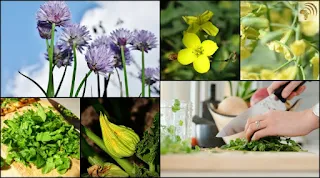Adding edible flowers to recipes is a very common practice. Eating flower blooms has a very long history in Africa. Squash and zucchini flowers are a common sight in African kitchens.
 |
Squash and zucchini flowers are a common
sight in African kitchens. |
Every
year around springtime during the months of September, October and November, the
desert South Africa Namaqualand region comes alive with a sea of colorful
indigenous wild flowers.
With
the blessings from Mother Nature, Namaqualand displays around 1,000 - 4,000
different species of plants and flowers each season. Many flowers are inedible however;
five flowers are commonly used in cooking African food.
Edible
flowers are flowers that can be consumed safely, below are five edible flowers
to add to your home recipes. Always try to pick the blooms as close to when you are going to use them as possible.
Five
Edible Recipe Flowers
Arugula Flowers
Young
arugula flowers have a milder, subtler flavor than the arugula leaves, and can
be used in many of the same dishes, such as salads and many egg dishes.
Starflowers
Blue
borage, also known as a starflowers are the perfect flower to add to salads, as
they have a taste similar to that of cucumber. The blue flowers are very
beautiful and look impressive in a fruit salad.
Squash, Pumpkin and Zucchini Flowers
Squash, pumpkin and zucchini flowers are a common sight in African kitchens. Squash and zucchini
plants are a valuable crop as they produce a large number of flowers on each
plant, meaning you can harvest some flowers and still leave plenty behind to
turn into vegetables.
Broccoli Flowers
Broccoli
flowers add a milder broccoli taste to dishes, pairing well with salad greens
where their bright yellow color stands out.
Chive Flowers
Chives are a member of the onion family with beautiful purple flowers.
They
are a great addition to mashed potatoes, adding striking purple flecks of color.
New recipe
Pumpkin Leaves Stew
Chibwabwa pumpkin
leaves stew recipe is warm, comforting recipe full of healthy pumpkin leaves.
Pumpkin plants have large, dark green, lobed leaves containing plenty of fiber,
iron, protein, calcium, vitamin A, C and per one cup of leaves, there are only
7 calories.
Ingredients
3 handfuls young pumpkin leaves
1 medium onion chopped
2 medium tomatoes diced
1/2 teaspoon salt
1 minced garlic clove
1/2 teaspoon black and red pepper
1 diced hot pepper
2 cups water
Salt to taste
Directions
Add all ingredients simmer 30 minutes. Serve with rice or bread.









